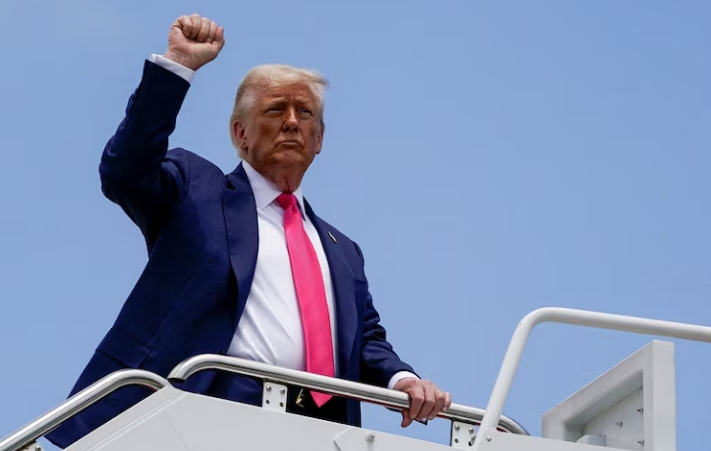Trump Poised to Unleash Crypto and Private Equity on America's Retirement Savings
Picture this: American citizens retirement savings, once tethered to the predictable hum of stocks and bonds, now free to surf the wild tides of Bitcoin or fuel the next tech unicorn through private e

Picture this: American citizens' retirement savings, once tethered to the predictable hum of stocks and bonds, now free to surf the wild tides of Bitcoin or fuel the next tech unicorn through private equity. This isn’t a speculative fantasy—it’s a seismic shift on the horizon, driven by President Donald Trump’s impending executive order to fling open the $9 trillion US retirement market to alternative investments.
Trump’s plan, which could take effect as soon as this week, promises to redefine how Americans stash away their nest eggs. By injecting cryptocurrencies, gold, and private equity into 401(k) plans, the administration aims to unshackle savers from the traditional confines of mutual funds and usher in a new era of financial opportunity—or volatility, depending on who’s watching.
Breaking the 401(k) Mold
For decades, 401(k) plans have been the bedrock of American retirement savings, letting workers funnel pre-tax earnings into a curated menu of stocks and bonds. These plans, holding a hefty slice of the $12.5 trillion retirement market, have stuck to a conservative script—publicly traded securities, packaged neatly in mutual funds. Trump’s executive order, however, is set to rip up that playbook.
The directive will prod regulatory agencies to dismantle barriers that keep alternative assets out of professionally managed 401(k) funds. Think digital currencies like Bitcoin, precious metals like gold, and private equity vehicles that bankroll everything from corporate buyouts to toll roads. The White House frames it as a mission to “restore prosperity for everyday Americans and safeguard their economic future,” though details remain fluid until Trump’s signature hits the page.
Crypto’s Mainstream Moment
For the crypto crowd, this is the kind of validation they’ve been chasing.
Trump has already thrown his weight behind digital assets, axing Biden-era rules that sidelined crypto in retirement accounts and cheering on a trio of crypto-friendly bills that cleared the House recently. His family’s $2 billion plunge into Bitcoin and stablecoins via Trump Media & Technology Group only sharpens the narrative: the administration is all-in on this digital gold rush.
If 401(k) plans open their doors to crypto, the ripple effects could be massive. Billions in retirement dollars might flow into Bitcoin and its kin, juicing demand and potentially igniting prices. For an industry once dismissed as a fringe experiment, this could cement its place at the grown-ups’ table—though not without the stomach-churning volatility that keeps skeptics up at night.
Private Equity’s Trillion Dollar Prize
Private equity titans like Blackstone, Apollo, and BlackRock are licking their chops at the prospect. With traditional fundraising from pensions and endowments hitting a wall, the 401(k) market looms as a tantalizing frontier. These firms have been laying the groundwork—Blackstone’s teamed up with Vanguard, Apollo’s partnered with Empower, and BlackRock’s cozying up to Great Gray Trust—all betting on a flood of retirement cash to fuel their next wave of growth.
The numbers speak for themselves. Private equity assets have more than doubled in the past decade, even as public markets shrink, with fewer US companies trading since the 1990's peak. Tapping 401(k)s could funnel hundreds of billions into illiquid bets on startups, real estate, and leveraged buyouts, promising savers a shot at juicier returns—if they’re willing to stomach the lockups and opacity.
The Risk Factor
Here’s the rub: alternative investments aren’t exactly comfort food for retirement savers. Crypto’s rollercoaster swings can turn a nest egg into confetti overnight. Private equity’s long holding periods—sometimes a decade or more—mean your money’s tied up when you might need it most. And both come with heftier fees and murkier valuations than the plain-vanilla funds dominating 401(k)s today.
Plan administrators, too, are sweating the legal heat. If these bets sour, lawsuits could pile up—unless Trump’s “safe harbor” provision shields them from liability. Still, the shift demands a leap of faith from savers used to the relative safety of the S&P 500, raising the stakes for education and oversight.
Trump’s Deregulation Playbook
This isn’t a bolt from the blue—it’s vintage Trump. His first term saw the Department of Labor green light private equity in retirement plans, a move Biden later scrapped. Now, with a fresh mandate from the 2024 election, Trump’s doubling down on deregulation and crypto boosterism. Wall Street’s already buzzing—shares of Blackstone, Apollo, and KKR spiked this week, outpacing the broader market as investors smell a windfall.
The timing’s no accident. Trump campaigned on unshackling crypto from “overly harsh regulations,” crediting the industry’s support for his victory. This executive order is both a policy pivot and a political flex, blending economic populism with a family-sized stake in the game.
What’s Next?
As the ink dries on Trump’s order, the spotlight shifts to regulators. How fast can they clear the path? What guardrails will they erect to shield savers from the wilder edges of these assets? The answers will shape whether this becomes a golden ticket for diversification—or a cautionary tale of overreach.
For now, imagine your 401(k) unshackled—tracking not just the Dow’s steady climb, but Bitcoin’s dizzying arcs or the quiet hum of a private equity fund building tomorrow’s giants. It’s a tantalizing vision, one that could redraw the retirement landscape for millions. But with bigger rewards come bigger risks, and America’s savers are about to step into uncharted territory.
Disclaimer: The views in this article are from the original Creator and do not represent the views or position of Hawk Insight. The content of the article is for reference, communication and learning only, and does not constitute investment advice. If it involves copyright issues, please contact us for deletion.